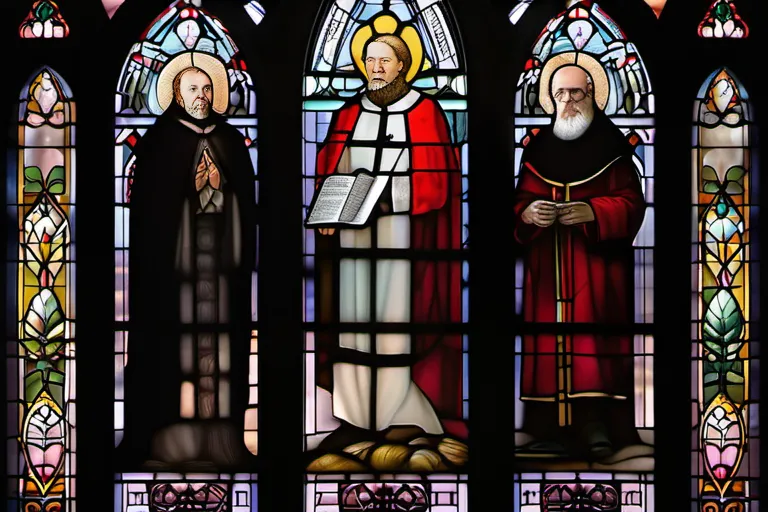Explore the history, doctrine, and practices of the Anglican Church in this detailed article.
The Anglican Church is a global Christian denomination with a rich history and unique beliefs. In this article, we will delve into the origins, doctrines, and practices of the Anglican Church to provide you with a comprehensive understanding of its beliefs.
The Origins of the Anglican Church
Imagine stepping back into history, where the roots of one of Christianity’s major branches are firmly planted. The Anglican Church, once a part of the Roman Catholic Church, saw a transformation during the tumultuous period of the 16th century. How did this change come about?
The story begins with King Henry VIII, who found himself at odds with the Pope over his desire to annul his marriage to Catherine of Aragon. This rift led to a split, and in 1534, the English Parliament declared the king as the Supreme Head of the Church of England. This action was revolutionary and marked the beginning of what would become known as the Anglican Communion.
The divorce, however, was just one part of a larger movement that sought to reform the church from within. Figures like Thomas Cranmer played pivotal roles in creating new liturgies and establishing an English Book of Common Prayer, which would become central to Anglican worship practices worldwide.
What followed was not merely a political shift but a cultural and religious revolution. The Church of England sought to merge elements of the Protestant Reformation with traditional Catholic practices. This blend created a unique liturgical style that emphasized both scripture and tradition, setting the stage for what we now know as Anglicanism.
The church then began its expansion beyond the shores of England, spreading across continents through colonialism and missionary work. Today, the Anglican Communion numbers over 80 million people in more than 165 countries, making it one of the largest Christian denominations globally.
This journey from a royal decree to a worldwide church reflects not just religious change but also social and political evolution. The Anglican Church, with its diverse practices and beliefs, stands as a testament to how religion adapts and transforms over time, much like a tree that grows strong in the face of various storms.
Anglican Doctrine: The Thirty-Nine Articles
The Thirty-Nine Articles: A Pillar of Anglican Doctrine
How do these articles shape our understanding of Anglicanism?
In exploring Anglican doctrine, one cannot overlook the significance of the Thirty-Nine Articles, a foundational document that outlines core beliefs. These articles were crafted in 1563 during the reign of Queen Elizabeth I, aiming to establish a clear and concise statement of faith for the Church of England.
Imagine these articles as the bedrock upon which Anglican theology stands; each article is like a cornerstone, essential for the structure’s integrity. The first article, for instance, begins with a direct challenge: ‘We utterly forbid any man to deny the Holy Scripture to be given by inspiration of God.’ This statement alone underscores the central role of scripture in Anglican belief.
The articles cover a wide range of topics from the nature of God and the Trinity to baptism, Eucharist, and ecclesiastical government. They address controversies that had divided Christians throughout history, providing clarity and unity amidst diversity. For example, Article XXVIII on free will poses a rhetorical question: ‘Can man do any thing good in this life without the grace of God?’ This article delves into the theological debate over human ability versus divine intervention.
The articles also address issues such as infant baptism and the real presence of Christ in the Eucharist, offering Anglican perspectives on these practices. They establish a middle ground between the Protestant emphasis on scripture alone and Catholic doctrines, creating a unique identity for Anglicanism that values both reason and revelation.
The Role of Scripture in Anglicanism
The Bible, to Anglicans, is like a lighthouse guiding ships through stormy seas. It serves as both the foundation and the compass for their faith. But how do Anglicans interpret this ancient text? And what role does it play in their daily lives?
For many Anglicans, Scripture is not just read but lived out. They see the Bible as a living document that speaks to them in the context of their modern world. However, the question arises: How do they ensure they are interpreting the text correctly? Enter the tradition of Scriptural interpretation. Anglicans believe in both literal and symbolic interpretations, depending on the passage and the broader context.
In Anglican theology, the Bible is seen through the lens of tradition and reason. This means that while the Scripture is central, it is not the only source of truth. The Book of Common Prayer, for instance, often cites or paraphrases Scripture, showing how these texts are woven into their liturgy and prayers.
The process of interpretation in Anglicanism is a delicate balance. It involves seeking wisdom from the wider Christian tradition while also acknowledging the unique insights offered by contemporary scholarship. This approach ensures that the Bible remains relevant and accessible to every generation, much like adapting a classic novel into a modern film.
The challenge for Anglicans lies in harmonizing these diverse sources of authority. How do they ensure their interpretation aligns with the core messages of faith? The answer often comes from a commitment to community and dialogue, where different perspectives can be shared and understood.
In summary, the role of Scripture in Anglicanism is multifaceted. It provides a moral compass, guides worship practices, and serves as a foundational text for understanding God’s will. By embracing both literal and symbolic interpretations, Anglicans strive to keep the Bible alive and relevant in their spiritual journeys.
Anglican Sacraments: Baptism and Eucharist
Imagine entering a church for the first time, surrounded by the familiar yet somehow different atmosphere of the Anglican tradition. One of the most striking aspects you might notice is the emphasis on baptism and eucharist. These sacraments hold a central place in Anglican worship and practice, much like the sun and moon holding sway over the day and night.
Let’s delve into baptism first. This ceremony is more than just a ritual; it’s a metaphor for rebirth. Just as a seed needs to be buried in the soil to sprout, so too does a person need to experience this act of immersion or sprinkling to enter the Christian community. But why such an emphasis? Is it not simply about joining a religious group? The answer lies deeper: baptism marks the beginning of a journey of transformation and growth. It is a symbol that you are stepping into a new life in Christ, washing away sins and embracing a fresh start.
Now, turn to the eucharist, often called the Lord’s Supper or Holy Communion. This sacrament is like a meal shared by travelers on a long journey, offering sustenance for the body and soul. It commemorates the last supper Jesus had with his disciples before his crucifixion. Through this act of breaking bread and drinking wine, Anglicans believe they are partaking in the body and blood of Christ. But isn’t it just a symbolic gesture? Indeed, it is much more. It’s a reminder of the covenant made between God and humanity, a way to experience the presence of Christ and strengthen one’s faith.
Baptism and eucharist are not merely acts; they are profound expressions of Anglican beliefs. They serve as anchors in the stormy seas of life, grounding believers in their faith and providing them with the tools to navigate through challenges. These sacraments are living testimonies that Christianity is a vibrant, dynamic journey, not just a static set of doctrines.
Understanding these sacraments helps us see why they are so integral to Anglican worship. They offer more than spiritual sustenance—they are vital components in the lives of believers, guiding them through their faith and providing a constant reminder of God’s love and presence. Just as bread and water are essential for physical survival, baptism and eucharist serve as spiritual nourishment for the soul.
The Anglican Church’s Approach to Ministry
Imagine walking into the heart of an Anglican Church, where every role within the congregation plays a symphony of service. How do bishops, priests, and deacons contribute to this rich tapestry? Let’s explore their roles in ministry.
Bishops are like the conductors of this church orchestra. They hold a significant position, overseeing dioceses with ecclesiastical authority. Bishops are appointed by the Archbishop or the Queen, depending on the region. Their role involves guiding and supporting priests, ensuring doctrinal purity, and promoting unity within the Anglican community.
Priests, often referred to as the “shepherds of the flock,” carry out the core duties of ministry. They perform sacraments, preach sermons, provide spiritual guidance, and offer comfort during times of need. Just as a shepherd tends to his sheep, priests tend to their congregation, ensuring that each member feels cared for and guided in their faith journey.
Deacons, on the other hand, are like the bridge between the clergy and laity. They assist in worship services, distribute communion, and engage in outreach activities. Deacons often have a unique perspective, as they might be ordained from various walks of life. Their role can vary widely; some focus on pastoral care while others take on administrative responsibilities.
Together, these roles form the backbone of Anglican ministry, each playing a crucial part in sustaining and nurturing the faith community. Just like the different instruments come together to create harmony, bishops, priests, and deacons combine their efforts to ensure that every member of the congregation feels valued and supported.
Anglicanism Today: Global Impact and Challenges
Today, the Anglican Church stands as a testament to its rich history and enduring influence. How does it navigate the complexities of modern society while maintaining its traditions? The global presence of the Anglican Church is truly remarkable; imagine a vast tapestry woven across continents, each thread representing a different community but all interlinked by shared beliefs and practices.
From small villages in Africa to bustling cities in North America, the Anglican Church faces numerous challenges. How does it address issues like climate change, social justice, and religious pluralism? These questions are not just academic; they directly impact how the church operates today. Consider the metaphor of a ship sailing through turbulent waters; the Anglican Church must steer its course with wisdom and resilience.
The contemporary landscape is marked by a diverse array of voices and perspectives within the church. How does it balance tradition with innovation, ensuring that its teachings resonate in the hearts of modern followers? The Anglican Communion comprises over 80 million people worldwide, making it one of the largest Christian denominations globally. This vast community shares not only a common faith but also faces similar challenges and opportunities.
One key challenge is the division within the communion itself. How can the church maintain unity despite differing views on social issues like LGBTQ+ inclusion? It’s akin to having multiple voices in a choir; while each may sing differently, they must harmonize to create a beautiful melody. The Anglican Church is at a crossroads, where old traditions meet new realities, and it must find its way forward with grace and understanding.
In exploring these challenges, the Anglican Church embarks on a journey of self-discovery and transformation. It’s not just about surviving but thriving in an ever-changing world. As we delve deeper into this chapter, consider how you might contribute to or be affected by the church’s ongoing journey. The story of the Anglican Church is far from over; it continues to evolve and inspire.
Conclusion
 By the end of this article, you will have gained valuable insights into the Anglican Church’s history, doctrine, and practices. You will be equipped with knowledge that will help you appreciate the unique aspects of this denomination and deepen your understanding of Christianity as a whole.
By the end of this article, you will have gained valuable insights into the Anglican Church’s history, doctrine, and practices. You will be equipped with knowledge that will help you appreciate the unique aspects of this denomination and deepen your understanding of Christianity as a whole.











